

There are many Russian-speaking citizens in Israel — natives of Russia and other post-Soviet countries — who faced the Hamas invasion on October 7. Some have sons and daughters who went to the front lines, others have lost loved ones or nearly died themselves, and others have become refugees. More than 250,000 Israeli civilians have been forced to flee their homes because of the constant shelling by Hamas and Hezbollah. Three families told The Insider about the war and how it has impacted their lives: one family miraculously survived a terrorist attack and became refugees, another had three men drafted into the war within an hour, and a third mother didn't know if her son was alive for 24 hours, after he had gone to the music festival in Re’im.
Content
The Rozhanski family: “We're glad we were together when the terrorists attacked”
Elena Niv: “For 24 hours, I didn't know if my son was alive”
Maria: “In one hour, three men in our family went to war”
The Rozhanski family: “We're glad we were together when the terrorists attacked”
The Rozhanski family repatriated from Pskov in 1991 and have been living in Israel's northernmost town, Kiryat Shmona, for the past 30 years. NNow, due to Hezbollah shelling, the town has been almost completely evacuated. But Rozhanski found herself in evacuation centres and hospitals much earlier. On the eve of the Hamas attack, almost the entire family gathered at her daughter's home in Kibbutz Holit, near the Gaza border. Retiree Julia Feinstein (86), her daughter, Alla Rozhansky (57), a machine tool operator at the optical factory, son-in-law and chess coach osef Rozhansky (67), granddaughter Anat Dymshitz (36) and four great-grandchildren, Shani (10), Gefen (8), Ofek (6), and Ladi (4), were nearly killed when terrorists blasted the door to their house and then tried to blow up the door to the security room.
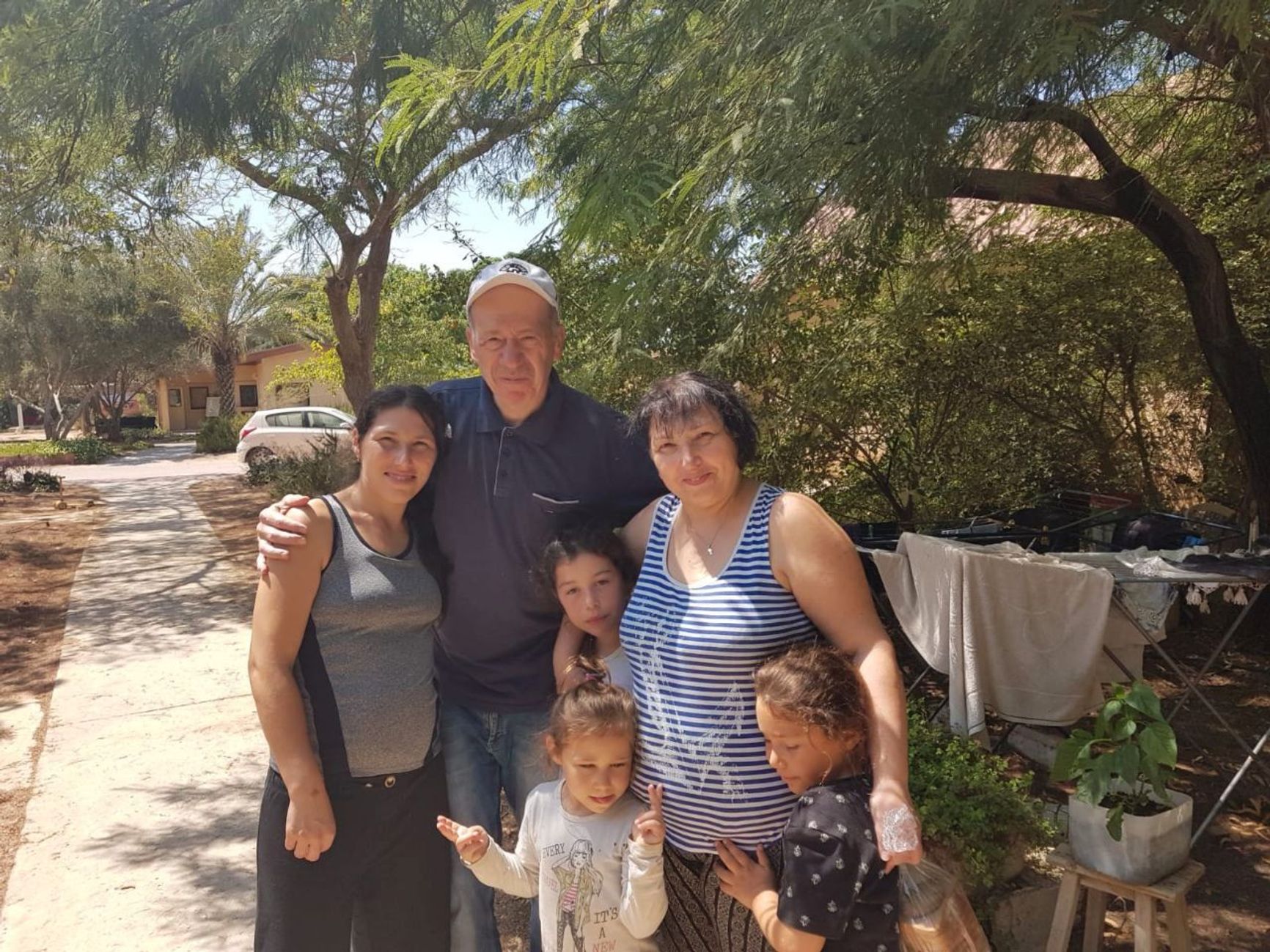
The Rozhanski family in kibbutz Holit
Anat: My husband Michael is also from Russia, he repatriated when he was 17. And I came to Israel when I was 4 years old, so my Russian is much worse. In Russia I was Anna, but here it's hard to pronounce, so I became Anat. We were still at school when we went to see the kibbutzim. They are green, beautiful, and children can run free in the streets. That's how we came to Holit. I'm a chemist who works in a laboratory in a factory 7 minutes from home. My husband does mathematical modelling in physics. He left for a conference in France a few days before the militant attack. My father was here for the holidays and helped us. And my mother and grandmother came to celebrate Shabbat together and then to take my father home.
The alarm went off at half past six. My father was out for a walk in the kibbutz at that time. He didn’t immediately realise that it wasn’t a drill. But he managed to get home before the terrorists arrived. We closed the doors. We blocked one of them, the glass one, with a couch and locked ourselves in the mammad [also known as the “miklat,” a reinforced security room required in all new buildings by Israeli law — The Insider].
At 7 a.m. we heard gunfire and Arabic being spoken outside. We had a small and weak self-defence unit. The security coordinator was killed instantly. There were only two people defending the kibbutz. One member of the unit was simply not there at the time. His wife, Adi Kaplun, took a shotgun and when the terrorists broke in, she managed to kill one of them. Unfortunately, she was killed and her children were taken to Gaza. Another terrorist was killed by a kibbutz resident with his personal weapon after a gunman shot his 12-year-old daughter in the head. Fortunately, the girl was saved. There were indeed many terrorists. After the military arrived and cleared the streets, 25 bodies were found.
One terrorist was killed by a kibbutz resident with his personal weapon after a gunman shot his 12-year-old daughter in the head
Our kibbutz is divided into two parts, each with several rows of houses. We knew from the silence that the terrorists were in the other half of the kibbutz, and we would go out to get supplies or go to the toilet. At 9 o'clock, our neighbour Mariam wrote that she was suffocating — the terrorists had set fire to her house. It turned out that several buildings were already burning. My mum and dad poured water on the trees around our house to stop the fire spreading to us.
I took a wet towel to protect myself from the smoke and ran to Mariam's. I called for help from another neighbour, Shir, from a nearby house, and then from two men, Ariel and Oz. I managed to tear down the blinds and open the iron shutters. By then Mariam had already passed out. She was lying on the bed and her face was blackened. The men pulled Mariam out and carried her into their room. She has now been discharged from hospital and is doing well.
Ariel and Oz instructed me on how to properly close the door of the shelter so that it could not be opened from the outside.
Alla: After Anat returned, we locked ourselves in the mammad. They started knocking on the door. We didn't answer. My daughter explained that everyone should keep quiet. The terrorists were looking for children by following the sound of their screams. Our youngest grandson, four-year-old Ladi, has developmental problems, he couldn’t understand that he had to be quiet. My daughter held him in her arms the whole time and he screamed. The terrorists realised that there were children inside and started breaking in.
The terrorists realised there were children inside and started breaking in
My husband and I held the door so the terrorists couldn't open it. And then there was an explosion. I managed to push my mother to the floor, one of our granddaughters was on the bed and everyone else was injured. It was a very powerful grenade. Some of the shrapnel went through the door. My husband's leg was broken, my leg muscles and my right buttock were torn to the bone. I was covered in blood. My daughter made a tight bandage for my husband and I put something on my wound. Anat had a small piece of shrapnel in her hand and Ladi had four tiny pieces in her chest. Six-year-old Ofik was the worst hit, with a badly damaged leg.
Then the terrorists tried to lure us out. They promised in English that they would help the children. Then they took a phone from someone who had been killed and started texting the kibbutz group to get us out. Then they forced one of Avital's neighbours to call us all out. They took her to Gaza, and with her the two small children of the murdered woman, Adi Kaploun. They were later released for an interview on Al Jazeera.
They didn't arrive until half past seven at night. But we were in such a state that the five hours passed like five minutes. My granddaughter and I were immediately taken by car to Kibbutz Re’im, where a first aid station had been set up. Then we were taken by helicopter to the hospital with the wounded soldiers. At the hospital I was immediately taken to the operating theatre. When I came to, the first thing I heard was that my granddaughter and my husband were fine.
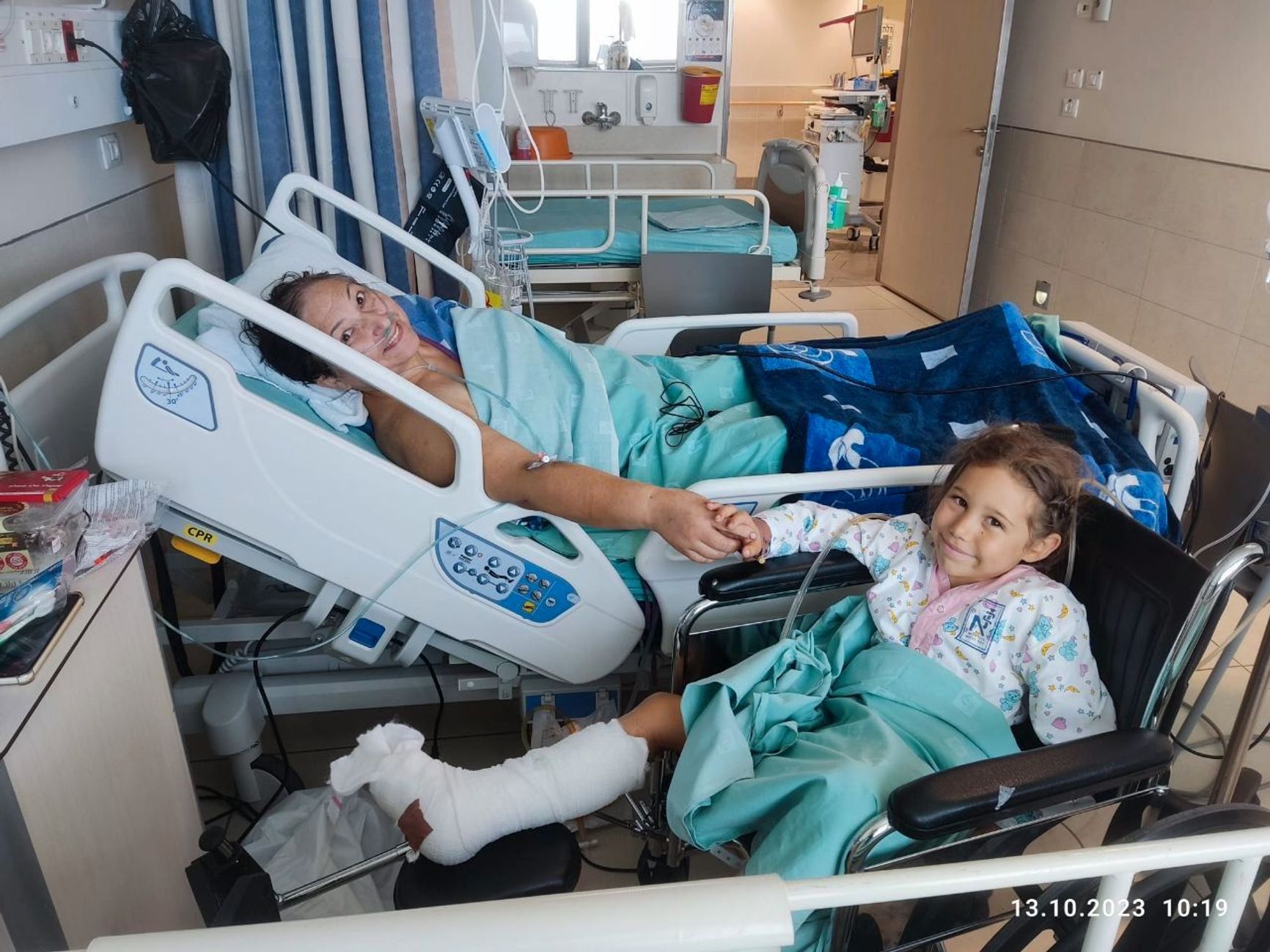
Alla and Ofik at the hospital
Yosef: In light of what the militants did in Kfar Aza and in Be'eri, I realize what would have happened if we had opened the door. Alla and I and my wounded granddaughter would have just been shot because we couldn't walk. And the rest of us would have been taken to Gaza. And either kept there until now, or released and made a film for Al-Jazeera about how humane they are.
Anat: The wounded were taken away and we were left to wait for evacuation. First they took us to another kibbutz, Gvulot, where we spent the night, and then they evacuated us south to Ein Gadi, between Eilat and the Dead Sea. But I couldn't stay there, because my family is in the hospital. Luckily we were called to stay at the religious kibbutz Beerot Yitzhak in the centre of the country. They gave us two rooms in a guesthouse. We still live there: we have three beds, two mattresses and a playpen for the youngest. We have no belongings. We are like refugees. From time to time, kind people invite us to stay for a week in an empty flat. But I prefer to stay where I won't have to leave in a week's time.
My husband came from France as soon as he could - a day earlier than planned. He went to Holit to see if our house had been ransacked, to bury a neighbour's dog that had been shot by terrorists. To enter a kibbutz, you need a permit and an escort of soldiers. There are many mines. For example, the terrorists put Adi Kaploun's body in one of the rooms, covered it and booby-trapped it. In total, 15 people died in our kibbutz.
The terrorists put out neighbor’s body in one of the rooms, covered it and booby-trapped it
I dream of returning to Holit. It's my home. We have some broken windows, but it seems that everything can be repaired. The factory where I work was hit harder. They stole computers and even forklifts from the warehouse. But we'll rebuild there too.
Alla: Yosef's left leg was cut off below the knee, Anat had a splinter removed and another granddaughter had a splinter removed from her buttock. The youngest has not yet been operated on because the shrapnel is small. Ofik has had four operations on her right leg, the fourth being plastic surgery. She walks although she’s in a cast.
I'm still in a cast. I still have to have an operation. I also have to do something about the blood in my lungs. I don't know if I can go back to the factory. Treatment and rehabilitation will take a year, but we've already been given an allowance.
I think we were lucky. We were together [when the terrorists attacked]. I don't know if Anat and her grandchildren would have been able to hold the door. They would have been killed or taken hostage. But now we're all alive — and that's the most important thing.
Elena Niv: “For 24 hours, I didn't know if my son was alive”
Elena Niv is from Belarus. Now she lives in the north of Israel, in the town of Kiryat Ata, near Haifa. Her only son Eliezer was caught in the middle of the terrorist attack on October 7.
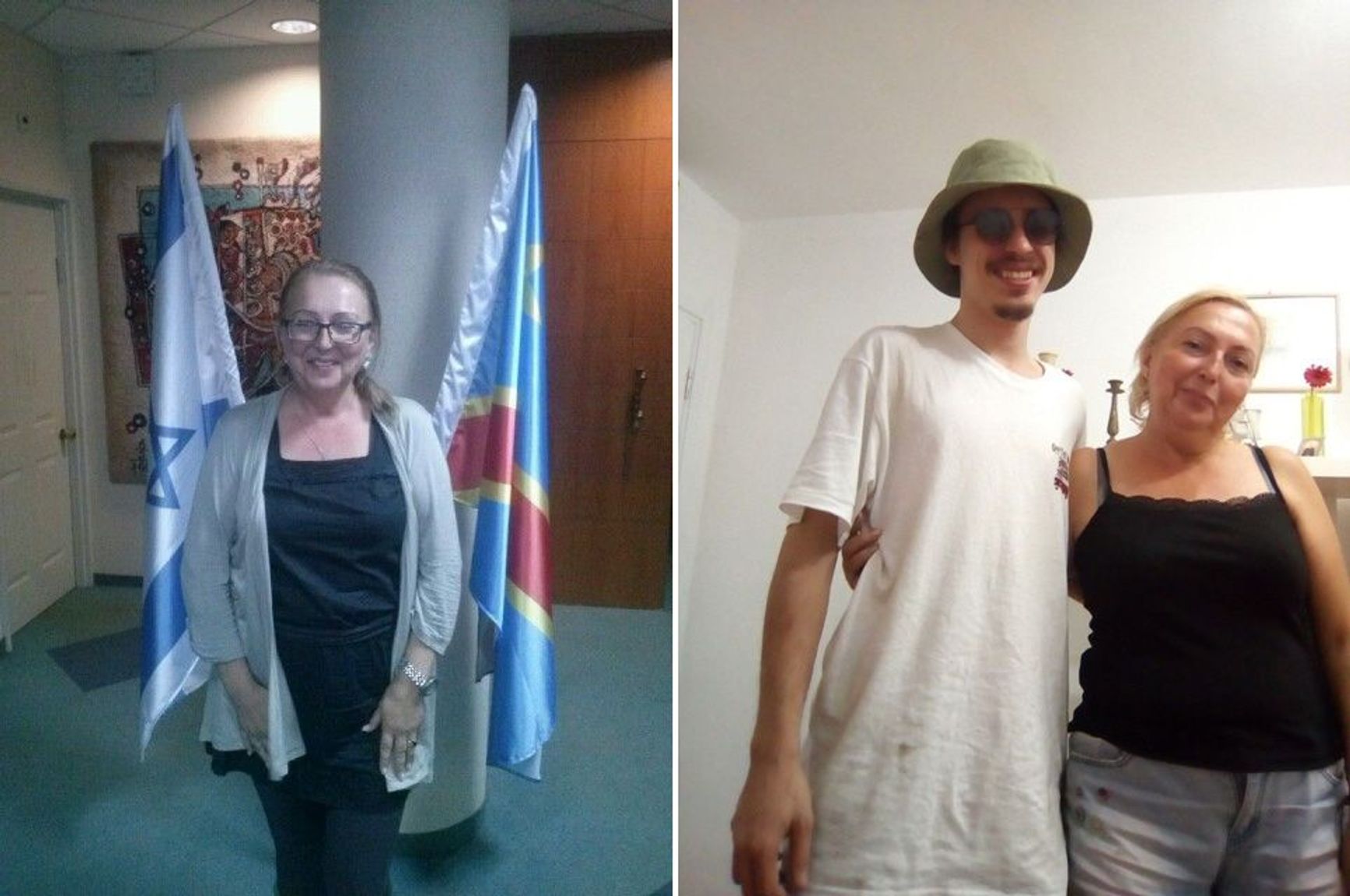
Elena Niv and her son
I've been off sick for four weeks after a nervous breakdown. For 24 hours I didn't know if my son was still alive. I rehabilitate children with autism and young people with schizophrenia and give psychological help. I can calm anyone down, and now I'm a shoemaker without shoes.
My son is trying to convince me that he wasn't at the music festival in Kibbutz Reim where so many young people were killed. Maybe he just doesn't want me to worry. In any case, Eliezer was in the south when the terrorists attacked. At 7.15am on 7 October, I received a text message from my son saying: “Mum, I'm OK.” It was the most frightening thing I’ve ever seen in my life.
His girlfriend, Maya, is from Sderot, where Hamas killed many people too. She either dragged Eliezer out of the festival to her parents, or they were at her parents’ [house] from the beginning. Either way, the whole family was trying to get out of town on 7 October when there was fighting with terrorists in the streets. Their car was even hit by a bullet. And while they were getting out, I called the Missing Persons Centre, because at that time I didn't know what was wrong with them. I didn't hear from my son for hours. Now he's near the Dead Sea with his girlfriend's relatives. And I understand how the mothers whose sons didn't come back feel.
I understand how the mothers whose sons didn't come back feel.
Now it's hard for me to even go out to the pharmacy to buy the medication I've been prescribed. I’ve lost 15 kilos in these three weeks. I switch on the television to hear voices to calm me down.
We repatriated in 1997 from Vitebsk and first lived in a kibbutz in the north under the “First Home in the Homeland” program. We were immediately hit by the Katyushas [Any unguided rockets from Soviet and Chinese multiple rocket launchers are labeled “Katyushas by Russian speakers in Israel — The Insider], which were fired at us from Lebanon. My dad was a military man, commanded all the deputy political officers in the unit and often took me with him. I used to play as a kid around these rockets. And here they were coming at us.
In addition to working with schizophrenic patients, I work in our courthouse in Haifa. Girls clean there: Russians, Ukrainians, Ethiopians, and I have to check their work. On the 8th of March there was a party [for all the workers], and the Russians and Ukrainians had a fight about the war in Ukraine, and didn’t speak to each other afterwards. But when the war in Israel started, everyone made up.
After the war started, a lot of people from Belarus wrote to me. On the one hand, they were somehow worried about me. On the other hand, it looked like harassment. One of them, a lawyer, wrote: “Go back to Belarus as soon as possible.” Who told you that's my home? I’ve lived here half my life. I have a son here. I speak Hebrew as well as Russian. I even think in Hebrew. If the Arabs want to throw us into the sea, as they dream, let them. I won't leave.
Maria: “In one hour, three men in our family went to war”
Maria moved to Israel from Riga in 1999. Her husband, Leonid, a native of Kyiv, repatriated a few years earlier. They have five children from their first marriages: Leonid has three and Maria has two. They live in Karmiel, a city in the north of Israel.
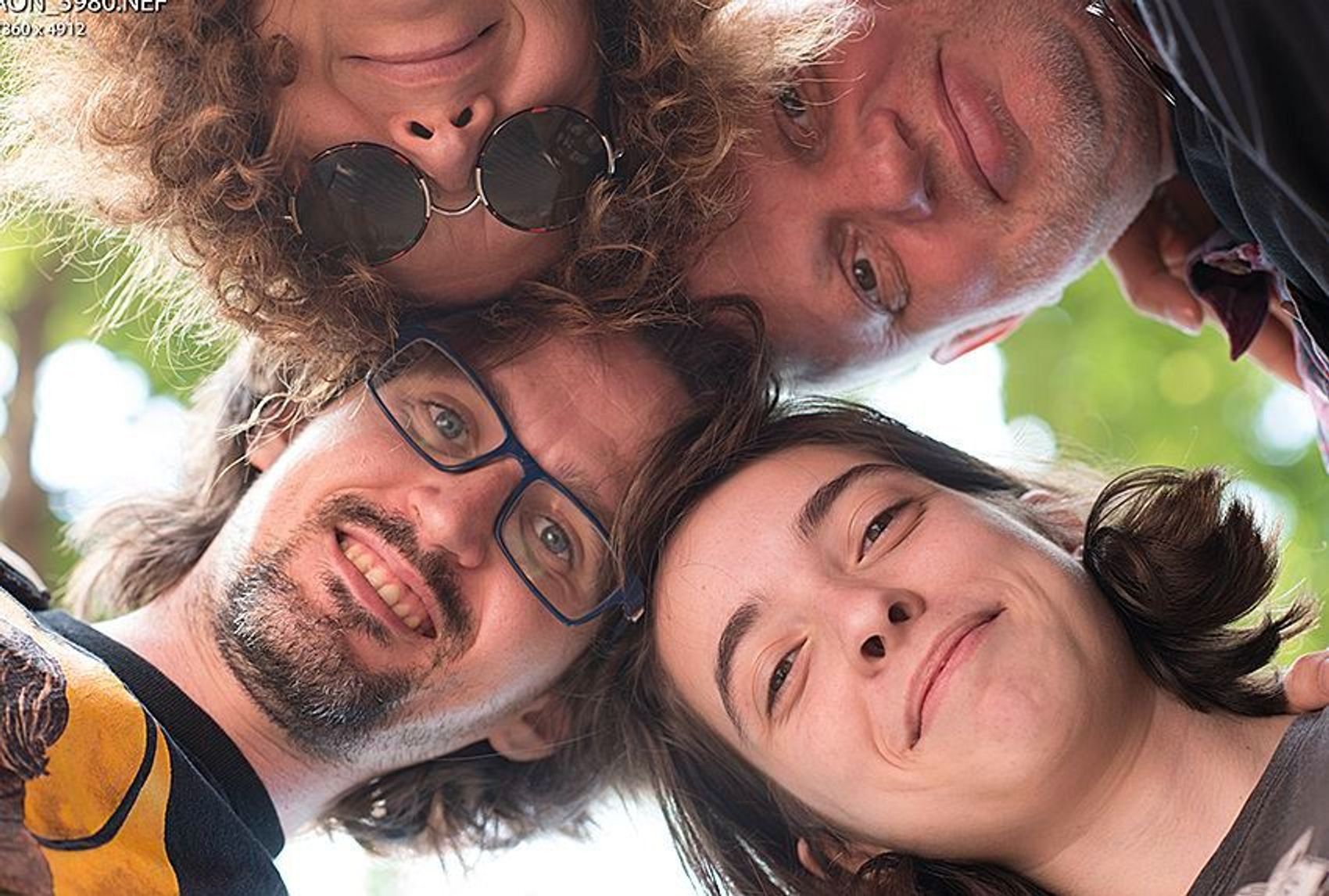
Maria with her husband and two sons
I am a photographer, shooting weddings and other events. My husband is a software engineer programmer, and so are all the children. We built ourselves a big house and live in it together: the two of us, the children, my mother, five dogs, three cats and a parrot. Our older children are 33 years old, but they still don't want to move out — they are happy with us.
That day, October 7, nobody understood anything for a long time. We were sitting downstairs in our room watching the news to see what was going on. Suddenly, my husband's son Danya came down in his military uniform and said: “Well, I'm off.” He got a call and was summoned to the miluim [reserve military service — The Insider]. He’s part of a tank unit, and he’s already in Gaza. Then my son Zhenya was called up, he serves in the Magav [Israeli Border Police — The Insider]. And the third was my brother, who was visiting us these days. He works in army logistics. Within an hour, three men in our family went off to war.
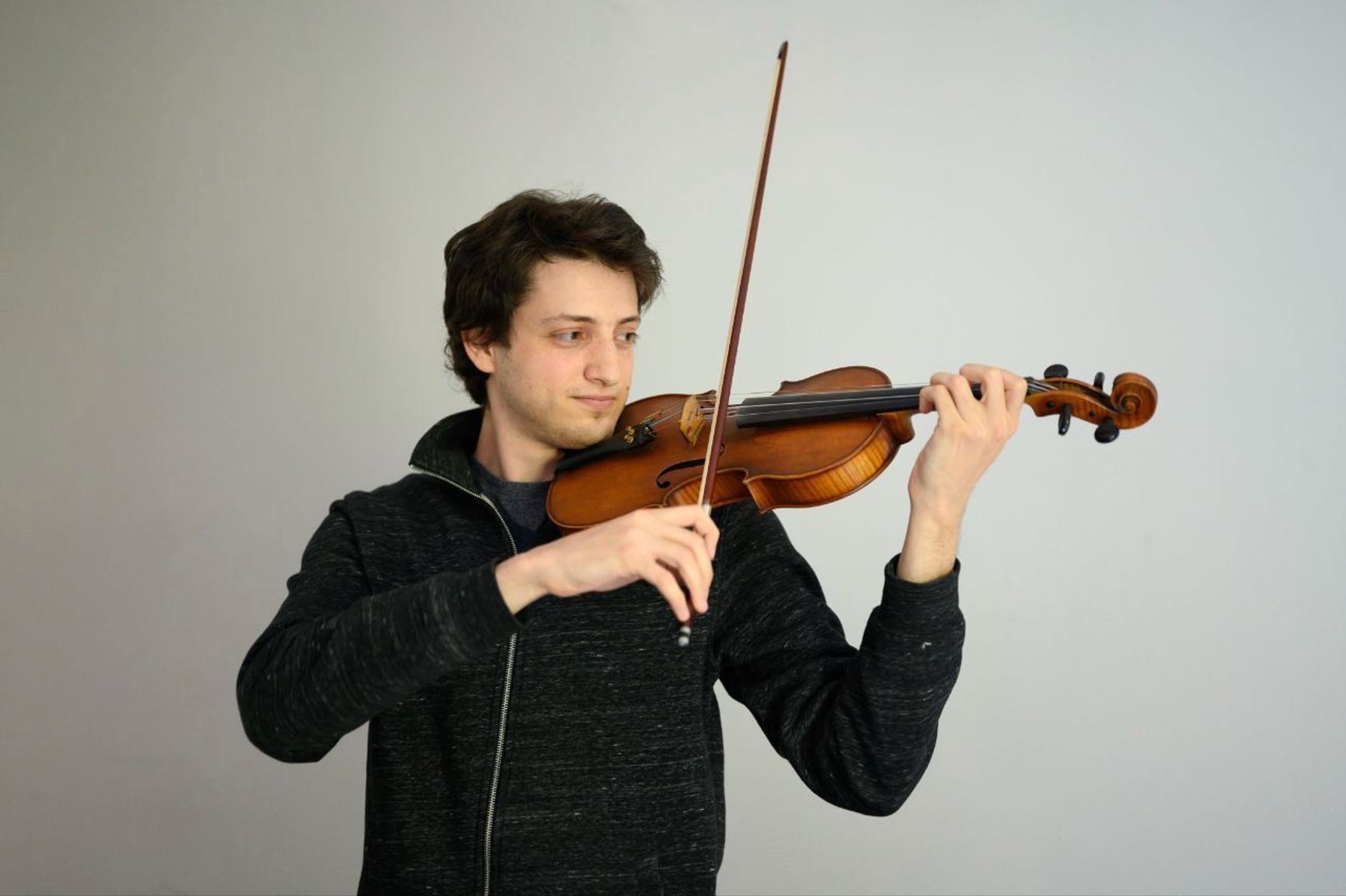
Maria's husband's son from his first marriage, Danya, is a tank commander serving in Gaza
My husband's eldest daughter, Alina, panicked: she went to Haifa, rented an apartment and bought a ticket to Europe, but she is afraid of flying. The youngest, 15-year-old Leia, was also scared. She had never seen anything like it. She asked us about the last war to calm her down. A Bruno Mars concert she was looking forward to was canceled. And for the first time in her life, I wouldn't let her go to Tel Aviv, where she has all her friends. I'd always let her go, but then I thought, “Oh my God, it's war, after all.”
My sons have already been back on leave. In general, I feel as if they're just serving in the army. Everyone was happy when they came back, we made them food and washed their clothes. I'm sure that everything will be fine for them and for us.

Maria's son Zhenya was also called up to fight and is now in the north of Israel manning security checkpoints
The last war has hardened us. We survived it in Nagariya, near the Lebanese border. There were 60 Katyushas a day, and there was no Iron Dome. A rocket hit my mother's house and blew everything up. A rocket once literally flew two meters above our heads. That was the first time I was really scared. It's easier now. We prepared our safe room. We bought some treats so we wouldn't get bored sitting there. We taught the dogs to go in there — it used to be my mum's room and pets weren't allowed in.
One day a rocket flew literally two meters above our heads. That was the first time I was really scared
I had less work. Bar Mitzvahs and birthdays were canceled. But Jews don't cancel weddings — dates are very important to them. And I mostly shoot religious weddings, where there is a separation between men and women, and I work in pairs with a male photographer. I had my first military wedding on the evening of October 7. It was terrible, to be honest. Everyone was crying, everyone had frightened faces. The groom was sobbing and couldn't stop, and the bride was sobbing under the chuppah [the canopy under which a Jewish couple stand during their wedding ceremony — The Insider].
Then there were weddings on October 8, 9 and 10. There was no more crying, but it wasn't much fun either. Israel is a small country and everyone had a relative, classmate or friend killed in the terrorist attack. Now weddings are almost like they used to be. Only almost all the men are armed and on holiday. Both young men and those in their 50s.